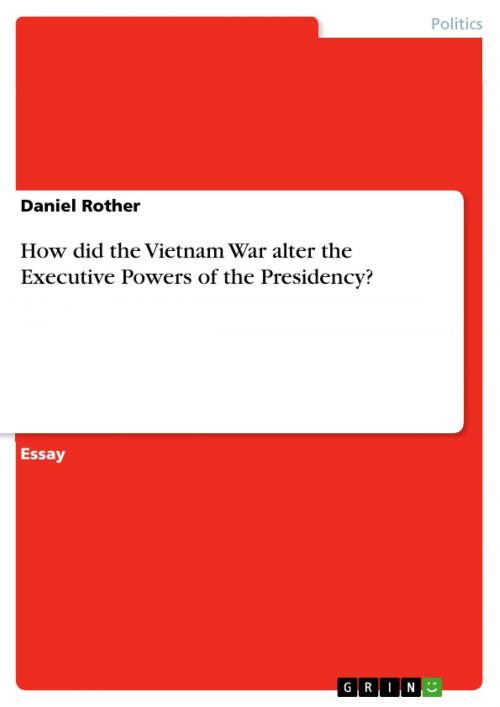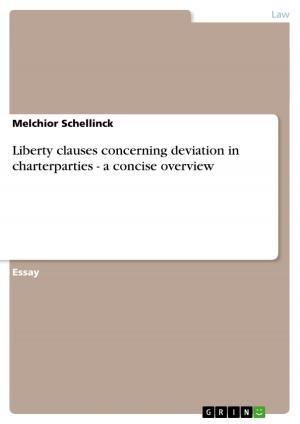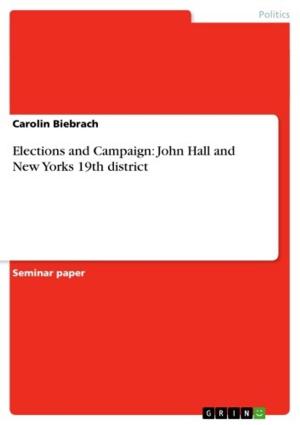How did the Vietnam War alter the Executive Powers of the Presidency?
Nonfiction, Social & Cultural Studies, Political Science| Author: | Daniel Rother | ISBN: | 9783638634601 |
| Publisher: | GRIN Publishing | Publication: | April 23, 2007 |
| Imprint: | GRIN Publishing | Language: | English |
| Author: | Daniel Rother |
| ISBN: | 9783638634601 |
| Publisher: | GRIN Publishing |
| Publication: | April 23, 2007 |
| Imprint: | GRIN Publishing |
| Language: | English |
Essay from the year 2006 in the subject Politics - International Politics - Region: USA, grade: A+ (1,0), Cardiff University (School of Humanities ), course: American Government and Politics in the 20th Century, 10 entries in the bibliography, language: English, abstract: The executive power of the US President in respect of the limits of this power set by the US Congress has changed dramatically since the first President George Washington in 1789. There has been a general shift towards the strengthening of the President, especially in the 20th century. Also in times of national and international crisis and wars, Americans tend to rally around the flag and around their leading figure - the President. In this time the power of the President increased significantly, an example being during the Civil War (1861-65), during the Blockade of West Berlin (1948/49) or since 9/11 (2001). The Vietnam War especially changed America in many ways, not only politically, but also economically and socially. The American engagement in the conflict in South-East-Asia lasted over two decades, four Presidents were involved and a huge amount of human and financial resources were invested to win the war. Results were for example stagflation in the US and in Europe, and a great distrust within American society towards their President. In this essay I will try to focus on the actions of President Johnson and in particular President Nixon, both of which altered the executive powers of the presidency during the time of the Vietnam War. I will also take a look at some of the actions the Legislature took to limit the power of the Executive. The essay starts with the increase of power of President Lyndon B. Johnson's 'Gulf of Tonkin Resolution' in 1965, and will continue with the increasing presidential power during the presidency of Richard Nixon. Finally it will end with some of the actions Congress took to limit the power of the President through the 'War Powers Act' of 1973. The book by Melvin Small 'At the Water's Edge' serves as the main source for this essay. Small describes the domestic issues of the Johnson and Nixon administration, and how the two Presidents were involved in fighting the war. The book 'The Presidents' by Stephen Graubard gave me good information for a better understanding of the actions of Johnson and Nixon. Furthermore the books 'American Government' by Dunn and Slann, 'Government and Politics of the United States' by Bowles, 'The basics of American Politics' by Wassermann and Ashbee's and Ashford's 'US Politics Today' gave me a good understanding of American politics during the Vietnam Era.
Essay from the year 2006 in the subject Politics - International Politics - Region: USA, grade: A+ (1,0), Cardiff University (School of Humanities ), course: American Government and Politics in the 20th Century, 10 entries in the bibliography, language: English, abstract: The executive power of the US President in respect of the limits of this power set by the US Congress has changed dramatically since the first President George Washington in 1789. There has been a general shift towards the strengthening of the President, especially in the 20th century. Also in times of national and international crisis and wars, Americans tend to rally around the flag and around their leading figure - the President. In this time the power of the President increased significantly, an example being during the Civil War (1861-65), during the Blockade of West Berlin (1948/49) or since 9/11 (2001). The Vietnam War especially changed America in many ways, not only politically, but also economically and socially. The American engagement in the conflict in South-East-Asia lasted over two decades, four Presidents were involved and a huge amount of human and financial resources were invested to win the war. Results were for example stagflation in the US and in Europe, and a great distrust within American society towards their President. In this essay I will try to focus on the actions of President Johnson and in particular President Nixon, both of which altered the executive powers of the presidency during the time of the Vietnam War. I will also take a look at some of the actions the Legislature took to limit the power of the Executive. The essay starts with the increase of power of President Lyndon B. Johnson's 'Gulf of Tonkin Resolution' in 1965, and will continue with the increasing presidential power during the presidency of Richard Nixon. Finally it will end with some of the actions Congress took to limit the power of the President through the 'War Powers Act' of 1973. The book by Melvin Small 'At the Water's Edge' serves as the main source for this essay. Small describes the domestic issues of the Johnson and Nixon administration, and how the two Presidents were involved in fighting the war. The book 'The Presidents' by Stephen Graubard gave me good information for a better understanding of the actions of Johnson and Nixon. Furthermore the books 'American Government' by Dunn and Slann, 'Government and Politics of the United States' by Bowles, 'The basics of American Politics' by Wassermann and Ashbee's and Ashford's 'US Politics Today' gave me a good understanding of American politics during the Vietnam Era.















